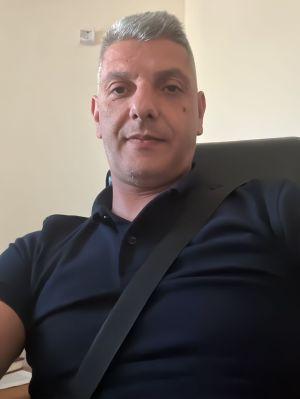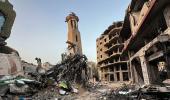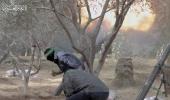'How can you shoot somebody raising a white flag, even if he's a fighter, when he's surrendered?'

In a seven-day truce in November last year, a month after the Hamas-led massacre killed 1,200 people in southern Israel, Hamas freed 110 hostages, including 80 Israelis. Israel in turn freed 240 Palestinian prisoners.
Of these Palestinian prisoners, 107 were children, and 75 per cent of them had not been convicted of a crime.
Israel holds nearly 10,000 Palestinians, including women and children, from Gaza and West Bank in custody,
While the Palestinian Authority governs 40% of the West Bank, security of the area remains with Israel. Israeli settlers and Palestinians in the West Bank are also tried by different courts -- military courts for Palestinians and civil courts for Jewish Israeli settlers living in the same occupied territory.
The army commanders in military courts have executive, legislative and judicial authority over the Palestinians living in the West Bank.
"Why take revenge on people who were not involved in the October 7 incident?" Raed Abu Hommus, who heads the International Relations unit of Commission of Detainees and Ex-Detainees Affairs, asks Rediff.com's Swarupa Dutt.
The Palestinian Authority set up the Commission in 1998 under the Oslo Accord to look into the welfare of Palestinian prisoners in Israeli jails as well as their families.
The concluding segment of a two-part interview:
- Part 1 of the Interview: 'Palestinians live in an open prison'
How do Palestinians in the West Bank react to Hamas?
Hamas is a very important layer in the Palestinian community. It's not something new and there are many people who love Hamas in the West Bank too.
There are images of these Gazans who were made to strip to their underwear, kneel on the street, wear blindfolds, and were whisked off in a military vehicle.
Do you have any idea where these men are? And is it possible for your Commission to release men like this?
We have had long discussions with the International Committee of the Red Cross about visiting prisoners, because the ICRC is allowed to visit Palestinian prisoners in Israeli regions.
But since this war, even the Red Cross is forbidden to visit the prisons -- not in the West Bank, not inside Israel and certainly not the new one -- a military camp in the south of Israel.
The Israeli soldiers arrested these Gazans, stripped them, blindfolded them and took them to this camp. We don't know the number of prisoners in this camp because since October 7, the Red Cross is not allowed to visit. So we don't know if they are alive, or whether they are martyrs.
We know even this much, only because of civilians in Gaza, and not from any organisation because its war out there and it's not easy to simply call and get information.
But we know that since the war began, Palestinians in prison are being denied food, fresh clothes, they are kept in dark cells in solitary confinement. They are not even allowed to step out of their cells and walk in the prison courtyard.
We know that in another prison, the police came in the morning and took away the mattresses from the cells so that the prisoner is forced to lie on the floor in this winter chill.
We know that the amount of food given to prisoners has been reduced; cigarettes and coffee allowed earlier are forbidden now, access to prison canteens is forbidden so that if you are hungry you stay hungry.
It's a disaster.
Six Palestinians have been killed in Israeli prisons since October 7. They were beaten to death.
The Israelis are taking revenge from Palestinian prisoners for October 7.
We know the Israelis come to the cells at night, pick up the prisoner and beat them in isolation cells. There are prisoners whose hands and legs are broken and they are denied medical treatment.

Before October 7, how often did this happen -- Palestinians picked up and taken away?
It's always happened, but after October 7, things changed.
For instance earlier, you could be put in an isolation cell if you break rules in the prison and for a maximum of a week or two weeks.
But now, the Israeli administration simply opens the cells and hit the prisoners on the head with iron rods like this man we know who was beaten to death.
Reducing food, indefinite solitary confinement, not allowing prisoners to shower, making them remain barefoot... all this did not happen earlier.
Let me clarify, if these abuses happened earlier it was because there were possible disagreements between the prisoner and the prison administration and they were punished but for a few days, not like now, which is indefinite punishment.
Apart from the six deaths you mentioned are there any other instances of custodial deaths since October 7?
We know about six deaths, but we have information that there are more in that military camp, I told you about in southern Israel, but we don't know the names of the prisoners.

What happens to the bodies? Are they given back to the families?
Of course not, the bodies are interred in prison. I think there are more than 16 bodies in prison, Palestinian martyrs whose families were denied the final rites.
Amnesty has flagged reports of mass enforced disappearances of Palestinian detainees. In the last two months, doctors, journalists were picked up and they've simply disappeared.
Does disappearance normally mean they've been killed?
If journalists or anybody for that matter have been picked up taken away from Gaza we have no way of knowing if they are alive.
But before October 7, of course, we knew. We have organisations inside Israel that we can call, give them the full name of the person and they help us locate the person in prison. Then, of course we follow up with lawyers.
So maybe for two for three days we will not know where the person is, but we get the information and if visits are not allowed, the lawyer will keep following up in court, till visits are allowed. But we had the information, we knew where he was.
At least 46 journalists were picked up after October 7 of which 32 are in prison, while 20 are under administrative detention.
Now, of course, Israel has cancelled appearances in military courts in the West Bank. Lawyers can't go to the court to meet the prisoners because prisoners are not brought to court. We are only told the date when the case will appear in court and proceedings are now strictly via video conference.

There was a prisoner-hostage swap in November 2023. What were the charges against the Palestinians who were released?
The charges against them were mostly participating in demonstrations, throwing stones, throwing Molotov cocktails... The prison terms ranged from a few months to two years. Some of the women were jailed for longer periods and they were really stressed.
The children who were released had been held because they had shared Facebook posts or 'liked' a post. They arrest anybody. You can be arrested for just putting a 'like' on a post put up by a freedom fighter who is wanted by Israeli intelligence.

What is the total number of Palestinian prisoners in Israeli jails?
In the West Bank, there are 7800 prisoners including women and children. There are roughly 3000 Gazans in prison as well.
Once these children, women, young men are released, is there a long-lasting psychological trauma?
Yes, of course, but this is a sensitive issue. Palestinians who spend a long time in prison certainly have psychological problems and they need counselling.
In the 2002 intifada around 4000 Palestinians were arrested and they were handed 20-year jail terms.
So, when you are released from prison into society, there is a process of relearning. They have been born again. We keep numbers and cases of prisoners with psychological trauma confidential.
But yes, the reports of physical and psychological abuse during arrest, transfer and interrogation are true.

The United Nations estimates that since 1967 there are 750,000 Palestinians who have been arrested in Gaza, West Bank, Jerusalem, put together.
Is prison a rite of passage for Palestinian men in the sense that are most young Palestinian men at one time or the other, taken away to Israeli prisons?
If you walk into a neighbourhood that has 50 houses, at least 30 will have had a member who is or was arrested. The other 20, if not the immediate family, there are certainly young men in prison from the extended family who are in prison. Anybody can be arrested, anybody.
And every family has a story of loss or humiliation or oppression due to the Occupation.
 IMAGE: Raed Abu Hommus
IMAGE: Raed Abu HommusWhat is the mood on the West Bank now?
It's a hard time. It's war. And not just in Gaza, even in the West Bank too. The Israeli military enters our cities every night and make arrests. Every night. It's not safe.
For example, on December 21, they arrested 30 people from the West Bank. On the same day they entered our neighborhood and shot three Palestinians on the street.
They get in and out at will. They are obviously taking revenge. There is nothing human about what they are doing.
In the videos posted by the Israelis themselves, soldiers break into apartments in Gaza where the families chose not to evacuate. The men are saying, 'we are civilians', but they are still shot.
It's incredible that all this is happening and the world is doing nothing.
Over 10,000 children have been killed in Gaza since October 7. It's horrific.
In December, Israelis killed three Palestinians holding white flags from Gaza. They were shot.
Israelis have no morals, no ethics, and they don't abide by the Geneva Convention. How can you shoot somebody raising a white flag, even if he's a fighter, when he's surrendered?
Since October 7, Israelis have made a 180 degrees flip in how they treat Palestinians. Earlier also it was very bad, but now it's unreal -- that's how horrific it is.
Why take revenge on people who were not involved in the October 7 incident?
Feature Presentation: Aslam Hunani/Rediff.com










